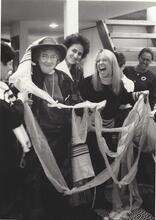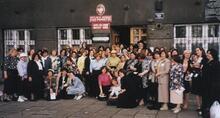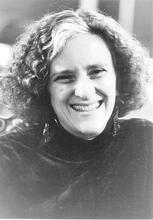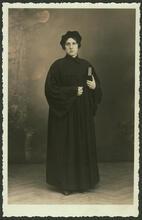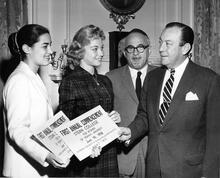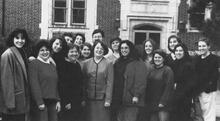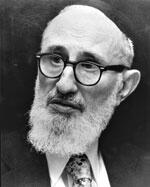Yoatzot Halacha
In 1997, Nishmat, a women’s seminary in Jerusalem, began training Orthodox women to become Yoatzot Halacha, or Jewish legal advisors. Yoatzot Halacha receive extensive training in Jewish legal texts as well as in the medical and behavioral sciences, and at the end of their training, a Yoetzet Halacha might answer questions through Nishmat’s hotline or website, or she might serve in a community in the United States, the United Kingdom, or Israel. Yoatzot Halacha are one of a number of innovations in the field of Orthodox women’s leadership and literacy and are changing the way Orthodox women relate to The legal corpus of Jewish laws and observances as prescribed in the Torah and interpreted by rabbinic authorities, beginning with those of the Mishnah and Talmud.halakhah. Instead of telling women to turn to a rabbi with a halakhic question, Yoatzot Halacha encourage them to study Jewish law and to search for answers on their own.
Origins and Development
In 1997, Nishmat, a women’s seminary in Jerusalem, began training Orthodox women to become Jewish legal advisors to other women, answering questions related to menstruation, pregnancy, sex, and childbirth. Rabbanit Chana Henkin, the founder and dean of Nishmat, referred to this program as the Yoetzet Halacha training program, and the women who completed the course of study were referred to as Yoatzot Halacha, or female advisors of Jewish law. Traditionally, Henkin’s title, “Rabbanit,” has referred to someone who is married to a male rabbi. Since the early 2000s, Orthodox women with extensive educations and in leadership positions have used the title to signify their religious authority. Henkin claimed that women in Orthodox communities were often too embarrassed to ask their rabbis questions about menstruation, pregnancy, and sexuality, leading to women making decisions for themselves, despite the fact that they lacked the education to do so. As a result, some women were too stringent with the law and others too lenient. Henkin’s goal was to increase women’s halakhic literacy in order to ensure that they were implementing the laws of Menstruation; the menstruant woman; ritual status of the menstruant woman.niddah and Lit. "family purity." Euphemistic reference to the laws of niddah.taharat ha-mishpahah in accordance with Orthodox practice.
Yoatzot Halacha receive extensive training in Jewish legal texts as well as in medical and behavioral sciences. The training, which usually takes about two years, includes the study of halakhah related to sexuality, family purity, birth, sex, and menstruation. Women study Talmudic sources, halakhic codes, and Halakhic decisions written by rabbinic authories in response to questions posed to them.responsa literature; take classes with rabbis and rabbinic decisors; and participate in seminars and lectures with medical and psychological experts in women’s health. This training prepares them to answer halakhic questions while considering the mental, behavioral, and physical elements of an individual’s question. In addition to providing halakhic guidance, therefore, Yoatzot Halacha also provide emotional support. Finally, Yoatzot claim authority that is based not just on their knowledge of halakhah but also on their experiences as Orthodox women who have been subject to these laws.
Yoatzot Halacha were initially trained to answer questions on a hotline in Israel. In its early years, the Golda Koschitzky Women’s Halachic Hotline received more than 100 calls each week. In 2002, Nishmat launched a website where it publishes questions that have been emailed to them and the answers they have provided. The website currently features questions in both Hebrew and English. By making the Q&A searchable by topic, Yoatzot Halacha have made information about women’s health and the laws of taharat hamishpacha widely available to an international audience.
Relationship to Orthodox Male Rabbis
Yoatzot Halacha position themselves as intermediaries between women and rabbis. As women, and as professionals who deal with women, they bring expertise that male rabbis do not have. This approach allows them to frame their task as serving alongside rabbis and to advocate for rabbinic opinions to be informed not just by halakhic expertise but also by expertise brought by various other professionals, such as mental health professionals.
Yoatzot Halacha thus both affirm and challenge the authority of male rabbis. On the one hand, Nishmat proudly affirms the authority of the male rabbis who teach and examine the Yoatzot Halacha. Additionally, before a woman submits her question to the website and at the conclusion of each answer, women are reminded that advice from a Yoetzet does not replace a rabbi’s ruling. On the other hand, Yoatzot Halacha exist for women who do not want to turn to their rabbi with a question. Yoatzot offer an alternative to rabbis, and as they insist on the importance of the experience and knowledge they bring as women, they suggest that rabbis cannot sufficiently answer women’s halakhic questions.
Relationship to Orthodox Women Rabbis
Yoatzot Halacha are among a number of innovations in Orthodox women’s leadership and literacy. These innovations include the Graduate Program in Advanced Talmud Study at Stern College, the growth of advanced halakhic training programs at seminaries in Israel, and the ordination of women at Yeshivat Maharat, which opened in 2009 and ordained its first female rabbi in 2013, among others. While the ordination of women has received significant criticism from right-wing Orthodox institutions, these same groups have given Yoatzot Halacha their stamp of approval.
The acceptance of Yoatzot Halacha is likely due to two factors. First, Henkin framed Yoatzot Halacha as helping women conform to Orthodox norms of family purity, sexuality, and reproduction. While the Orthodox rabbinic leadership might have been concerned that women’s halakhic literacy would draw them away from their family duties, Nishmat emphasized that it supported maintaining traditional gender norms.
The second reason Orthodox rabbis have expressed support for Nishmat is because it does not offer ordination. While Yeshivat Maharat offers women ordination and rabbinic titles, Yoatzot Halacha came to be an acceptable alternative for Orthodox women’s leadership in the eyes of male Orthodox rabbis. This distinction was made clear in 2017 when the Orthodox Union ruled that it was not permissible for synagogues to hire a female rabbi but that a Yoetzet Halacha could be hired with the approval of the community’s rabbis.
Transitioning to Communities
Yoatzot Halacha have been serving in communities in the United States, the United Kingdom, and Israel since approximately 2012. Synagogues and communities have hired Yoatzot Halacha to teach classes, answer relevant halakhic questions, guide brides and newlyweds through the initial practice of niddah, and to advise (male) rabbis. Because most Orthodox synagogues cannot afford to pay a Yoetzet Halacha on their own, Yoatzot are usually hired by multiple synagogues that share her salary. While in communities, Yoatzot Halacha create “health in halakhah” seminars, teach refresher courses on the laws of niddah, give lectures about sexuality, train bridal teachers, and answer questions from members of the community.
Publications
In addition to answering questions on the phone, online, and in communities, Yoatzot Halacha have also produced several publications. In 2012, Nishmat established the Machon Nishmat HaBayit, a research institute that publishes the questions and answers from Yoatzot Halacha. These publications are directed at the general public as well as students and teachers, and collections of questions and answers addressed by Yoatzot Halacha on particular topics—including immersing in a Ritual bathmikveh during Covid, managing OCD while observing the laws of family purity, menopause, birth, and birth control—can be downloaded from Nishmat’s website. A training manuals for bridal teachers is also advertised on the website.
In 2017, Nishmat published the first volume of Nishmat Habayit in Hebrew. An English version followed in 2022. The book contains over 60 questions that have been asked of Yoatzot Halacha as well as in-depth responses that contain halakhic analysis, medical information, and information relevant to the social-emotional context.
Covid-19
When Covid-19 led to the shuttering of synagogues, many Orthodox women wondered whether it was safe to immerse in the mikveh. In March 2020, Nishmat launched a page on its website about Covid-19, which included guidelines for mikveh attendants, what women should do if they or a member of their household are in quarantine when they need to immerse, and how to deal with menstruation disruptions that might have arisen from the Covid-19 vaccines. Nishmat was following guidelines from the Israeli Ministry of Health and updated the page until October 2021.
Many Orthodox women expressed displeasure with their rabbinic authorities for telling them that the mikveh was not safe to visit and they must remain in a state of niddah indefinitely. While in a state of niddah, a woman cannot have sex, engage in any physical activity with her husband, or get pregnant. Nishmat advocated for making the mikveh a safe place for immersion during the pandemic, arguing that the mikveh had to stay open because women’s observance of these laws would bring about mercy from god. In its March 2020 statement, it detailed guidelines for a kosher mikveh that it also considered safe from Covid-19 transmission. The guidelines were for women going to the mikveh to immerse as well as the women maintaining the mikveh and included requiring an appointment before visiting, avoiding congregating in any part of the mikveh, preparing at home, cleaning and disinfecting preparation rooms, and quarantining if sick.
Not every female halakhic authority agreed with Nishmat that it was possible to ensure that women could avoid contracting Covid-19 while at the mikveh. In March 2020, Rabbanit Dr. Chana Adler Lazorovits and Rabbanit Sarah Segel-Katz, two halakhic authorities in Israel, released a statement that used research about mikvaot in Israel and the lack of oversight from the state. They wanted women to know that there was not sufficient information about whether a local mikveh was conforming to public health guidelines. Rabba Dr. Carmella Abraham, a graduate of Yeshivat Maharat and a medical doctor, also wrote that shutting down the mikvaot would be the most “responsible and urgent communal response necessary for this moment.” Though she praised the mikveh guidelines presented by the Orthodox Union (OU), the Rabbinical Council of Bergen County (RCBC), and the Jewish Orthodox Women’s Medical Association (JOWMA), she drew on scientific research from the New England Journal of Medicine and elsewhere to argue that these guidelines would not be enough to make the mikvah a safe place.
Changing Women’s Relationship to Halakhah
Through their searchable website with tens of thousands of halakhic questions and answers, the booklets they produce, the webinars they host, the classes they teach, and the books they publish, Yoatzot Halacha are changing the way Orthodox women relate to halakhah. Instead of telling them to turn to a rabbi with a halakhic question, Yoatzot Halacha encourage women to study Jewish law and to search for answers on their own.
Lisa Septimus, a well-known Yoetzet Halacha in the Five Towns, an area of New York with a large Orthodox Jewish population, argues that Yoatzot “empower” women to understand halakhah and to make decisions on their own. Girls and women do not receive extensive educations in the laws of taharat mishpacha, despite the fact that they will be implementing these laws every month. And when women approach a rabbi with a question, they often receive an answer but are not taught how to evaluate the situation on their own. Yoatzot Halacha, however, are in the business of teaching women and explaining the laws to women who come to ask them questions. Septimus claims that this is a sign of progress in the halakhic system. For Septimus, Yoatzot Halacha are not just changing the halakhic system because they are women serving as halakhic leaders for women. They are also changing the way women engage with these laws.
Abraham, Carmela. “Rethinking Mikvah Attendance in the Midst of the Covid-19 Pandemic.” Jewish Telegraphic Agency, March 31, 2020, https://www.jta.org/2020/03/31/ny/rethinking-mikvah-attendance-in-the-midst-of-the-covid-19-pandemic
Avishai, Orit. "Halakhic Niddah Consultants and the Orthodox Women's Movement in Israel: Evaluating the Story of Enlightened Progress." Journal of Modern Jewish Studies 7, no. 2 (2008), 195–216, https://doi:10.1080/14725880802124214.
Cohen, Debra Nussbaum. “Family Purity Advisers: New Role for Orthodox Women Hits U.S.” Ha’aretz, October 31, 2013, https://www.haaretz.com/jewish/2013-10-31/ty-article/.premium/jewish-laws-friendly-female-face/0000017f-f64f-ddde-abff-fe6fe3070000
Eis, Atara and Laurie Novick. "Reconstruction in no Man’s Land." Tradition (New York) 51, no. 4 (Oct 1, 2019): 19–28, https://www-jstor-org.proxy.libraries.rutgers.edu/stable/26879555
Ganzel, Tova and Deena R. Zimmerman. "Women as Halakhic Professionals: The Role of the Yo'atzot Halakhah," Nashim : A Journal of Jewish Women's Studies & Gender Issues, no. 22 (2011): 162–171.
Ginsparg, Leslie M. "Defining Bais Yaakov: A Historical Study of Yeshivish Orthodox Girls High School Education in America, 1963–1984." PhD Diss, New York University, 2009.
Henkin, Chana. “Yoatzot Halacha: Fortifying Tradition through Innovation.” Jewish Action 60, no. 2 (1999), 1.
Raucher, Michal. "Yoatzot Halacha: Ruling the Internet, One Question at a Time." In Digital Judaism: Jewish Negotiations with Digital Media and Culture, ed. Heidi Campbell, 1st ed. London: Routledge, 2015.
Roness, Michal. The Yoetzet Halakhah: Avoiding Conflict while Instituting Change Waltham, MA: Brandeis University Press, 2012.

